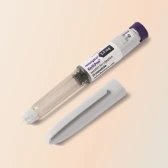Until very recently, people looking to lose weight had limited options open to them. You could take a pill, such as orlistat, or in some cases you might be eligible for bariatric surgery. But for the most part, you were expected to rely on diet and exercise alone. And as study after study has shown, that isn’t always a solution for long-term weight loss.
The introduction of drugs like Mounjaro, Wegovy and Saxenda has radically changed this picture. For the first time, people are being prescribed injectable medications that have been clinically shown to make a real difference. Less drastic than bariatric surgery, and more effective than orlistat, these types of drugs are associated with a weight loss of 10% or more.
These drugs (known as GLP-1 receptor agonists) are a type of peptide. Collectively, peptides represent an important new approach in weight management. In this article, we’ll demystify what peptides are and how some types can help with weight loss.
What are peptides?
Peptides are short strings of amino acids, the building blocks that come together to make up proteins. There are many different types of peptides, all of which play different roles in the body. For instance, peptides form the basis of hormones like insulin and oxytocin. Others play a role in the immune system or are involved in signalling between cells.
Therapeutic peptides are peptides used for medical purposes. They are either extracted from living organisms, where they naturally occur, or made in the lab. They’ve been around for a while—the first therapeutic peptide was insulin, used to treat diabetes, which was first extracted more than 100 years ago.
Since then, more than 80 therapeutic peptides have been approved for use, and at least twice that number are in clinical development. These drugs are used to treat everything from HIV to septic shock to erectile dysfunction. They may be safer than other types of drug, because they’re good at reaching the places they need to in the body, and their byproducts are generally non-toxic. Weight loss drugs are a new type of therapeutic peptide.
Understanding peptides and their role in weight management
The new peptide drugs for weight loss (Wegovy, Saxenda, Mounjaro and Rybelsus, which is a pill that's currently only prescribed for type 2 diabetes) are GLP-1 receptor agonists. That means they work by mimicking glucagon-like peptide 1 (GLP-1), a peptide hormone produced in the gut after meals. GLP-1 plays several important roles in the body:
- It stimulates the pancreas to release insulin after meals, which helps to move glucose (sugar) out of the blood and into the cells.
- It blocks the release of another hormone called glucagon, which works the opposite way to insulin.
- It interacts with various brain regions to reduce appetite and regulate digestion.
- It slows down the rate of gastric (stomach) emptying.
- It plays a role in reducing food cravings and ‘food noise’ (you spend less time thinking about food).
Weight loss peptide drugs contain molecules that are structurally very similar to the GLP-1 hormone. That means they bind to GLP-1 receptors in the gut, pancreas and brain, a bit like a key opening a lock. They unleash the same effects as the actual hormone would. Thanks to their popularity, a bunch of copycat products, such as GLP-1 patches have popped up that promise comparable results at a lower price. But confusingly, GLP-1 patches do not contain any GLP-1 medicines and aren't scientifically backed for helping with weight loss.
Mounjaro also works by mimicking another hormone, glucose-dependent insulinotropic polypeptide (GIP), which works in a similar way to GLP-1.
Types of peptides used for weight loss
Three peptide drugs are available for weight management in the UK:
Wegovy
Wegovy contains the active ingredient semaglutide, which works by mimicking a peptide hormone called GLP-1. It’s a once-weekly injection.
Saxenda
Saxenda contains the active ingredient liraglutide, which also mimics GLP-1. Although it’s very similar to semaglutide, it doesn’t last as long in the body, so you need to inject it every day.
Mounjaro
Mounjaro contains the active ingredient tirzepatide, which works by mimicking the peptide hormones GLP-1 and GIP. Like semaglutide, it’s a once-weekly injection.
Perhaps you’ve also heard of Ozempic? This drug contains semaglutide but it’s prescribed for diabetes, rather than weight loss. It’s become a bit of a catch-all term for weight loss medications, with many people seeking out ‘Ozempic alternatives’ from unregulated websites. Remember, you should only take weight loss peptides if a registered clinician has prescribed them to you.
New peptide treatments in development
New peptide-based weight loss injections that work differently are also being developed. Mazdutide works on the GLP-1 and glucagon pathway, helping to curb appetite and increase fat burning. There's petrelintide, which takes a novel approach by mimicking amylin, your body's natural satiety hormone.
Meanwhile, retatrutide (nicknamed 'triple G') targets three hormones at once: GLP-1, GIP and glucagon (GCG). To learn more about how retatrutide might be administered, check out our retatrutide dosage guide article.
Efficacy of peptide therapies in weight loss
In clinical studies, peptide therapies have been shown to be very effective for weight loss:
- In one trial, adults taking a higher 7.2mg dose of Wegovy lost an average of 20.7% of their starting body weight in 72 weeks.
- Another trial found that Mounjaro (tirzepatide) can lead to an average weight loss of up to 22.5% at the highest dose of 15mg over 72 weeks.
These drugs have been shown to have benefits beyond weight loss too:
Improving heart health
In one large study, people with cardiovascular conditions took semaglutide for four years. Regardless of how much weight they lost, they cut their risk of heart attacks, stroke, or other life-threatening heart events by 20%.
Improving brain health
Another study found that people taking these drugs had a lower risk of Alzheimer’s disease.
Reducing blood pressure
In another study, people taking tirzepatide saw meaningful reductions in their systolic blood pressure—up to 10.6 mmHg depending on the dose.
Reducing the risk of kidney or liver disease
These drugs have been found to reduce the risk of kidney failure by 16%. And although more research is needed, they may also have the potential to treat fatty liver disease.
Safety profile and potential side effects
Because all three peptide injections for weight loss work in a similar way, they are associated with similar side effects:
- Gastrointestinal side effects (burping, flatulence, constipation, diarrhoea, nausea and vomiting)
- Stomach pain
- Tiredness
- Dizziness
- Injection site reactions like irritation, itching and bruising.
These side effects are usually mild and manageable, and will clear up by themselves as your body gets used to the medication. But it’s important to take the drugs under medical supervision to minimise the risks. You should also make sure you’re living a healthy lifestyle, to give your body the best chance of responding the way it should.
Considerations for use
Peptide therapies for weight loss are a good option for many people who are struggling to lose weight through other means. To receive a private prescription for these drugs, you need to have a body mass index (BMI) of 30 or more, or a BMI of 27 or more along with at least one weight-related health condition.
But there are certain circumstances in which they won’t be suitable for you, for instance if you’re pregnant or breastfeeding, or if you’re living with certain medical conditions.
That’s why these drugs aren’t available over-the-counter—you need a prescription from a healthcare provider who can tailor your treatment to your individual needs. Since it’s important to follow specific dosing guidelines, and monitor for side effects, your relationship with that clinician should be ongoing. They will support you at every step of the way.
If you prefer an over-the-counter option instead, Glucomannan Complex capsules for weight loss provide a natural fibre-based approach to appetite control, backed by EFSA’s approved health claim when used with a calorie-restricted diet.
Could peptide drugs help kickstart your weight loss journey?
Peptide drugs are not a silver bullet for fat loss, and you’re unlikely to see dramatic effects straight away. That said, they can be very effective over the long term, as part of a treatment plan incorporating lifestyle changes. Why not spend a few minutes answering these questions to see if they might be right for you?






















